人教六年级英语下册 重点句型语法总结
最新人教版六年级英语下册各单元知识点总结归纳
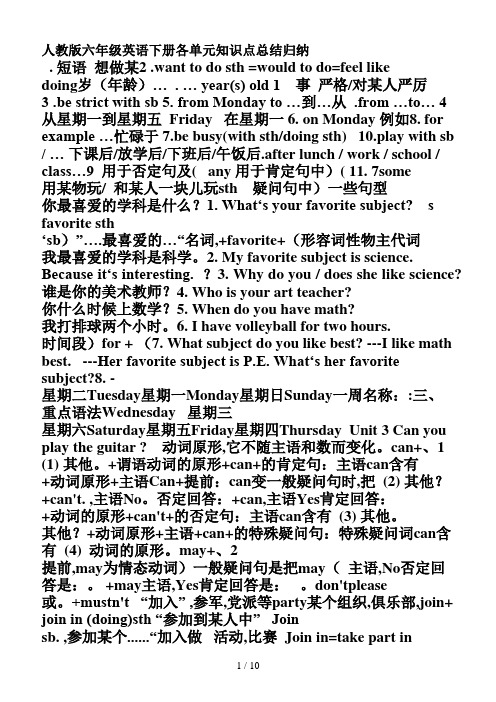
人教版六年级英语下册各单元知识点总结归纳. 短语想做某2 .want to do sth =would to do=feel likedoing岁(年龄)… . … year(s) old 1 事严格/对某人严厉3 .be strict with sb 5. from Monday to ...到...从 .from ...to (4)从星期一到星期五 Friday 在星期一 6. on Monday 例如8. for example …忙碌于 7.be busy(with sth/doing sth) 10.play with sb / … 下课后/放学后/下班后/午饭后.after lunch / work / school / class…9 用于否定句及( any 用于肯定句中)( 11. 7some用某物玩/ 和某人一块儿玩sth 疑问句中)一些句型你最喜爱的学科是什么?1. What‘s your favorite subject? s favorite sth‘sb)”….最喜爱的…“名词,+favorite+(形容词性物主代词我最喜爱的学科是科学。
2. My favorite subject is science. Because it‘s interesting. ?3. Why do you / does she like science? 谁是你的美术教师?4. Who is your art teacher?你什么时候上数学?5. When do you have math?我打排球两个小时。
6. I have volleyball for two hours.时间段)for + (7. What subject do you like best? ---I like math best. ---Her favorite subject is P.E. What‘s her favorite subject?8. -星期二Tuesday星期一Monday星期日Sunday一周名称::三、重点语法Wednesday 星期三星期六Saturday星期五Friday星期四Thursday Unit 3 Can you play the guitar ? 动词原形,它不随主语和数而变化。
六年级英语(下册)课文重点句子短语

六年级英语(下册)课文重点句子短语六年级英语下册课文重点知识点复习Unit1 Winter Activities一、重点句型1、Did you go anywhere in winter? 你冬天去了哪里?Yes,I went to see my friend 我去看望了我的朋友We listened to music together 我们一起听音乐2、Was it very cold there? 那里很冷吗?Yes, it’s cold and windy. 是的,那里又冷风又大。
3、There was a big ice city. There were many people. 那是个大冰城,那里有很多人。
4、How about you? 你呢?I traveled along the Yangtze River. 我沿着长江旅游5、I took a photo on my mobile. 我在我手机上拍了一照片Show me the photo, please. 请给我看照片Look, here it is. 看,这就是。
6、Look at the snowman. 看这个雪人It ‘s short and fat. 它又矮又胖7、Look at that man 看这个男人He’s tall and thin 他又高又瘦8、Show me the dress, please 请给我看下这条连衣裙Which dress? 哪一条连衣裙The long one 那长的一条9、Show me the skirt, please 请给我看下这条短裙Which skirt? 哪一条短裙The short one 那短的一条10.Very often they get New Year’s money from their parents. 经常,他们从父母那拿到压岁钱11.They have a good time in winter vacation 他们度过了一个美好的寒假时光二、重点短语1、go(went) to 去哪里2、climb(climbed) mountain 爬山3、travel(traveled) along 沿着。
人教版六年级英语下册 重点句型语法总结
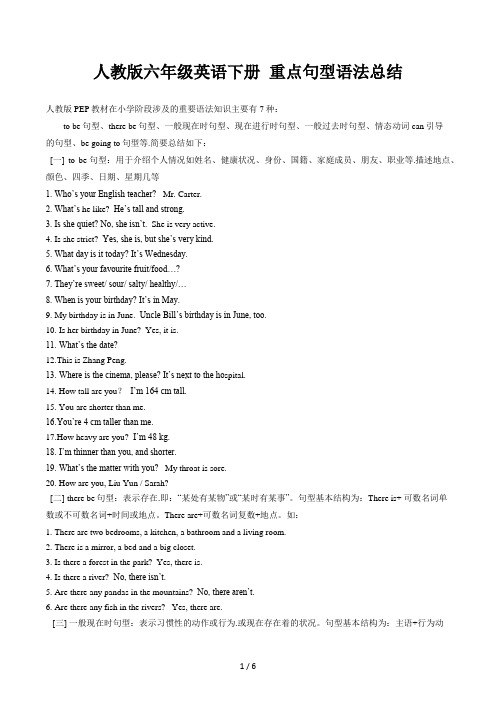
人教版六年级英语下册重点句型语法总结人教版PEP教材在小学阶段涉及的重要语法知识主要有7种:to be句型、there be句型、一般现在时句型、现在进行时句型、一般过去时句型、情态动词can引导的句型、be going to句型等.简要总结如下:[一] to be句型:用于介绍个人情况如姓名、健康状况、身份、国籍、家庭成员、朋友、职业等.描述地点、颜色、四季、日期、星期几等1. Who’s your English teacher? Mr. Carter.2. What’s he like? He’s tall and strong.3. Is she quiet? No, she isn’t. She is very active.4. Is she strict? Yes, she is, but she’s very kind.5. What day is it today? It’s Wednesday.6. What’s your favourite fruit/food…?7. They’re sweet/ sour/ salty/ healthy/…8. When is your birthday? It’s in May.9. My birthday is in June. Uncle Bill’s birthday is in June, too.10. Is her birthday in June? Yes, it is.11. What’s the date?12.This is Zhang Peng.13. Where is the cinema, please? It’s next to the ho spital.14. How tall are you?I’m 164 cm tall.15. You are shorter than me.16.You’re 4 cm taller than me.17.How heavy are you? I’m 48 kg.18. I’m thinner than you, and shorter.19. What’s the matter with you? My throat is sore.20. How are you, Liu Yun / Sarah?[二] there be句型:表示存在.即:“某处有某物”或“某时有某事”。
(完整版)人教版六年级下册英语知识点总结
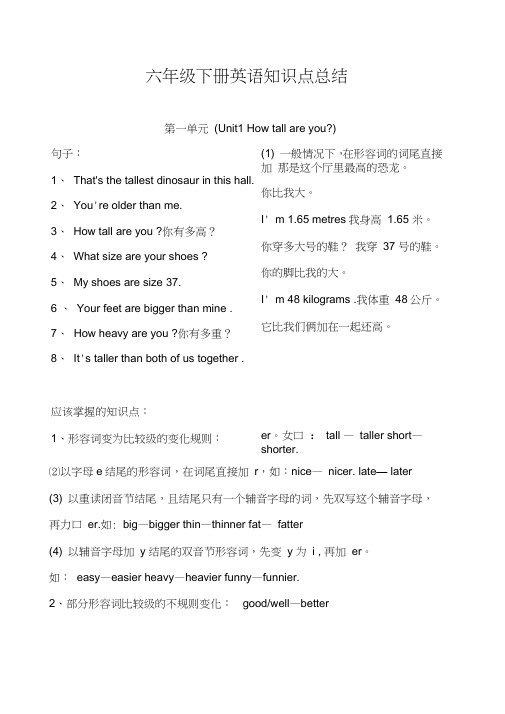
六年级下册英语知识点总结第一单元(Unit1 How tall are you?)句子:1、That's the tallest dinosaur in this hall.2、You're older than me.3、How tall are you ?你有多高?4、What size are your shoes ?5、My shoes are size 37.6 、Your feet are bigger than mine .7、How heavy are you ?你有多重?8、It's taller than both of us together .应该掌握的知识点:1、形容词变为比较级的变化规则:(1) 一般情况下,在形容词的词尾直接加那是这个厅里最高的恐龙。
你比我大。
I' m 1.65 metres我身高1.65 米。
你穿多大号的鞋?我穿37 号的鞋。
你的脚比我的大。
I' m 48 kilograms .我体重48公斤。
它比我们俩加在一起还高。
er。
女口: tall —taller short—shorter.⑵以字母e结尾的形容词,在词尾直接加r,如:nice—nicer. late— later(3) 以重读闭音节结尾,且结尾只有一个辅音字母的词,先双写这个辅音字母,再力口er.如: big—bigger thin—thinner fat—fatter(4) 以辅音字母加y 结尾的双音节形容词,先变y 为i , 再加er。
如:easy—easier heavy—heavier funny—funnier.2、部分形容词比较级的不规则变化:good/well—better3、 比较级的标志:tha n 。
弓I 导比较级的特殊疑问词: Which 。
句子结构为:Which+名词+is+形容词比较级。
比较级+and+比较级表示:越来越 ...4、 A 与 B 比较的句子结构: A+be 动词+形容词比较级 +than+B. 否定句句子结 构:A+be 动词+not+形容词比较级+than+B. —般疑问句句子结构:Be 动词+A + 形容词比较级 +than+B ?A 比B 多多少的句子结构:A+be 动词+数字+单位+形容词比较级+than+B 。
(完整版)人教版六年级英语下册重点句型语法总结
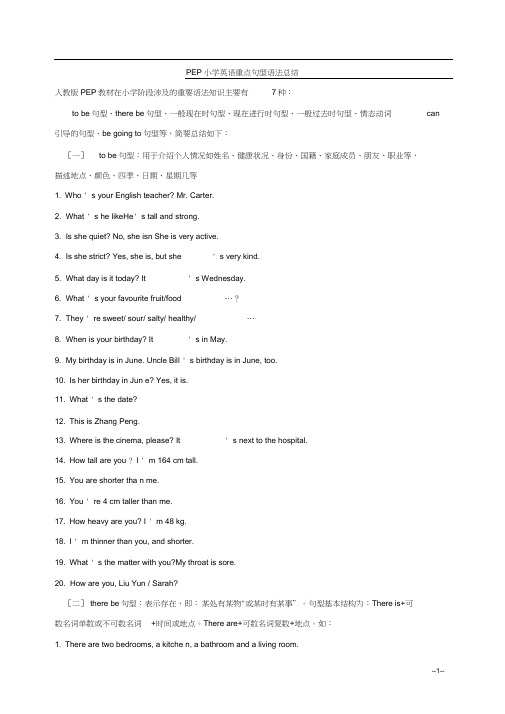
PEP小学英语重点句型语法总结人教版PEP教材在小学阶段涉及的重要语法知识主要有7种:to be句型、there be句型、一般现在时句型、现在进行时句型、一般过去时句型、情态动词can 引导的句型、be going to句型等,简要总结如下:[一]to be句型:用于介绍个人情况如姓名、健康状况、身份、国籍、家庭成员、朋友、职业等,描述地点、颜色、四季、日期、星期几等1. Who ' s your English teacher? Mr. Carter.2. What ' s he likeHe' s tall and strong.3. Is she quiet? No, she isn She is very active.4. Is she strict? Yes, she is, but she ' s very kind.5. What day is it today? It ' s Wednesday.6. What ' s your favourite fruit/food …?7. They ' re sweet/ sour/ salty/ healthy/ …8. When is your birthday? It ' s in May.9. My birthday is in June. Uncle Bill ' s birthday is in June, too.10. Is her birthday in Jun e? Yes, it is.11. What ' s the date?12. This is Zhang Peng.13. Where is the cinema, please? It ' s next to the hospital.14. How tall are you ? I ' m 164 cm tall.15. You are shorter tha n me.16. You ' re 4 cm taller than me.17. How heavy are you? I ' m 48 kg.18. I ' m thinner than you, and shorter.19. What ' s the matter with you?My throat is sore.20. How are you, Liu Yun / Sarah?[二] there be句型:表示存在,即:某处有某物"或某时有某事”。
人教版六年级下册英语知识点总结
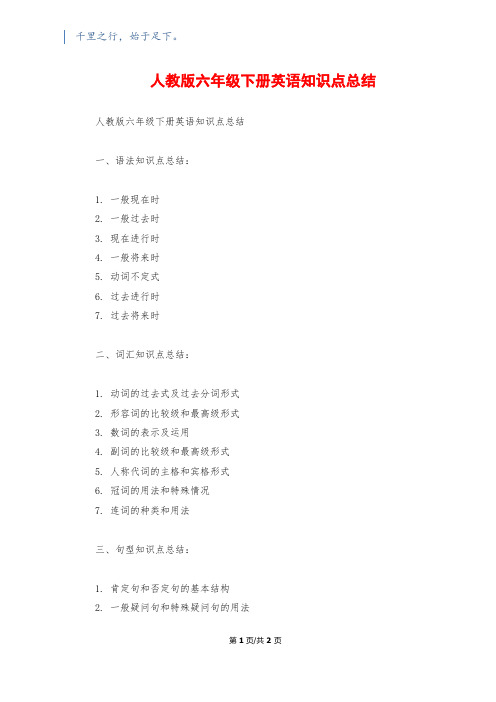
千里之行,始于足下。
人教版六年级下册英语知识点总结人教版六年级下册英语知识点总结
一、语法知识点总结:
1. 一般现在时
2. 一般过去时
3. 现在进行时
4. 一般将来时
5. 动词不定式
6. 过去进行时
7. 过去将来时
二、词汇知识点总结:
1. 动词的过去式及过去分词形式
2. 形容词的比较级和最高级形式
3. 数词的表示及运用
4. 副词的比较级和最高级形式
5. 人称代词的主格和宾格形式
6. 冠词的用法和特殊情况
7. 连词的种类和用法
三、句型知识点总结:
1. 肯定句和否定句的基本结构
2. 一般疑问句和特殊疑问句的用法
第1页/共2页
锲而不舍,金石可镂。
3. 感叹句的用法
4. 被动语态的构成和用法
5. 定语从句的引导词和结构
四、阅读技巧总结:
1. 阅读理解中的主旨理解和推断能力
2. 阅读理解中的细节理解和归纳总结能力
3. 阅读理解中的上下文推理和辨析能力
4. 阅读理解中的文章结构和段落内容的理解能力
五、写作技巧总结:
1. 英语作文的基本结构和要求
2. 英语作文的开头和结尾句型
3. 英语作文的衔接词和连接词的运用
4. 英语作文的语法结构和句式多样性
六、口语表达技巧总结:
1. 英语口语中的问候和自我介绍
2. 英语口语中的日常用语和口语表达
3. 英语口语中的交际技巧和场景应用
4. 英语口语中的听力和口语训练技巧
以上是关于人教版六年级下册英语知识点的总结,希望对你有所帮助。
六年级下册英语书笔记人教版
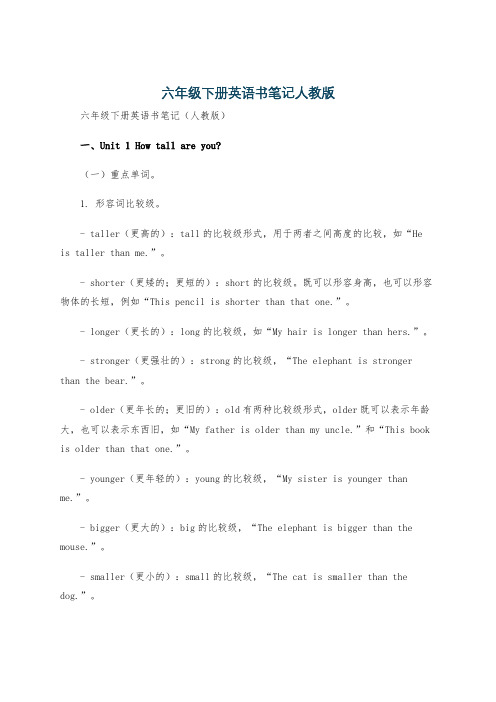
六年级下册英语书笔记人教版六年级下册英语书笔记(人教版)一、Unit 1 How tall are you?(一)重点单词。
1. 形容词比较级。
- taller(更高的):tall的比较级形式,用于两者之间高度的比较,如“He is taller than me.”。
- shorter(更矮的;更短的):short的比较级。
既可以形容身高,也可以形容物体的长短,例如“This pencil is shorter than that one.”。
- longer(更长的):long的比较级,如“My hair is longer than hers.”。
- stronger(更强壮的):strong的比较级,“The elephant is stronger than the bear.”。
- older(更年长的;更旧的):old有两种比较级形式,older既可以表示年龄大,也可以表示东西旧,如“My father is older than my uncle.”和“This book is older than that one.”。
- younger(更年轻的):young的比较级,“My sister is younger than me.”。
- bigger(更大的):big的比较级,“The elephant is bigger than the mouse.”。
- smaller(更小的):small的比较级,“The cat is smaller than the dog.”。
- thinner(更瘦的):thin的比较级,“She is thinner than her sister.”。
2. 其他重点单词。
- centimeter(厘米):长度单位,缩写为“cm”,例如“I am 150 centimeters tall.”。
- meter(米):长度单位,缩写为“m”,“The building is 50 meters high.”。
(完整版)人教版六年级英语下册知识点梳理
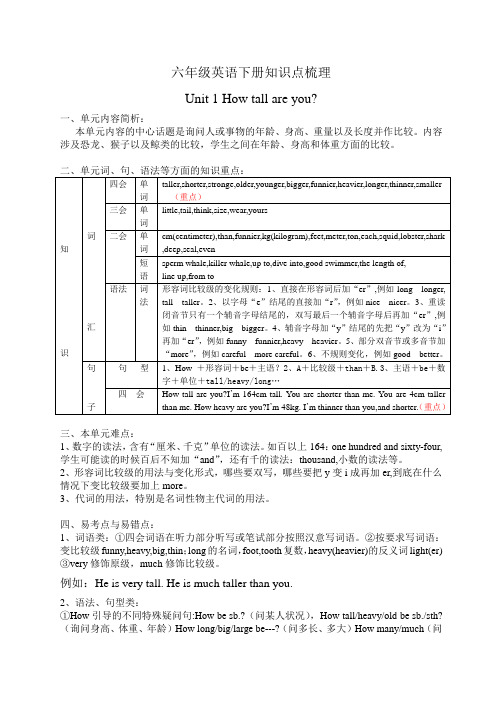
六年级英语下册知识点梳理Unit 1 How tall are you?一、单元内容简析:本单元内容的中心话题是询问人或事物的年龄、身高、重量以及长度并作比较。
内容涉及恐龙、猴子以及鲸类的比较,学生之间在年龄、身高和体重方面的比较。
三、本单元难点:1、数字的读法,含有“厘米、千克”单位的读法。
如百以上164:one hundred and sixty-four,学生可能读的时候百后不知加“and”,还有千的读法:thousand,小数的读法等。
2、形容词比较级的用法与变化形式,哪些要双写,哪些要把y变i成再加er,到底在什么情况下变比较级要加上more。
3、代词的用法,特别是名词性物主代词的用法。
四、易考点与易错点:1、词语类:①四会词语在听力部分听写或笔试部分按照汉意写词语。
②按要求写词语:变比较级funny,heavy,big,thin;long的名词,foot,tooth复数,heavy(heavier)的反义词light(er)③very修饰原级,much修饰比较级。
例如:He is very tall. He is much taller than you.2、语法、句型类:①How引导的不同特殊疑问句:How be sb.?(问某人状况),How tall/heavy/old be sb./sth?(询问身高、体重、年龄)How long/big/large be---?(问多长、多大)How many/much(问数量、价格)。
②比较级的运用,一定要是相同内容或类别才可以进行比较,这是学生最易出错和混淆娥地方。
例如:Mike’s legs are longer than (John),如果学生翻译会直接填写John,但是一分析就不难发现应该和John的腿作比较的,所以应该是John’s。
再比如My hair is longer than (she).如果不仔细分析大多数学生都会错填成:she,her,但是填hers才是正确的。
新人教版(PEP)小学英语六年级下册各单元知识点总结
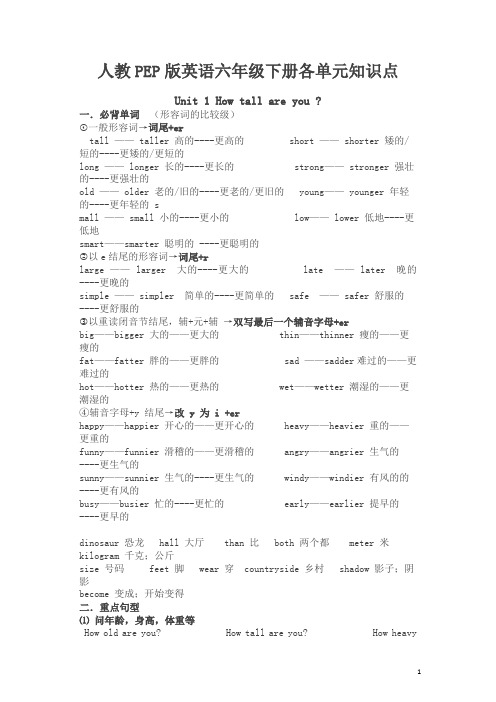
人教PEP版英语六年级下册各单元知识点Unit 1 How tall are you ?一.必背单词(形容词的比较级)①一般形容词→词尾+ertall —— taller 高的----更高的 short —— shorter 矮的/短的----更矮的/更短的long —— longer 长的----更长的 strong—— stronger 强壮的----更强壮的old —— older 老的/旧的----更老的/更旧的 young—— younger 年轻的----更年轻的 small —— small 小的----更小的 low—— lower 低地----更低地smart——smarter 聪明的 ----更聪明的②以e结尾的形容词→词尾+rlarge —— larger 大的----更大的 late —— later 晚的----更晚的simple —— simpler 简单的----更简单的 safe —— safer 舒服的----更舒服的③以重读闭音节结尾,辅+元+辅→双写最后一个辅音字母+erbig——bigger 大的——更大的 thin——thinner 瘦的——更瘦的fat——fatter 胖的——更胖的 sad ——sadder难过的——更难过的hot——hotter 热的——更热的 wet——wetter 潮湿的——更潮湿的④辅音字母+y 结尾→改 y 为 i +erhappy——happier 开心的——更开心的 heavy——heavier 重的——更重的funny——funnier 滑稽的——更滑稽的 angry——angrier 生气的----更生气的sunny——sunnier 生气的----更生气的 windy——windier 有风的的----更有风的busy——busier 忙的----更忙的 early——earlier 提早的----更早的dinosaur 恐龙 hall 大厅 than 比 both 两个都 meter 米kilogram 千克;公斤size 号码 feet 脚 wear 穿 countryside 乡村 shadow 影子;阴影become 变成;开始变得二.重点句型⑴ 问年龄,身高,体重等How old are you? How tall are you? How heavyare you?--- I’m _______ (years old). --- I’m ______metres tall. ---- I’m ______ kilograms .⑵ 问物品的情况:① How large is your room? 你的房间有多大?It’s ______ m (square meters.) 有___平方米。
六年级英语重点语法总结(英语句型知识点)

六年级英语重点语法总结(英语句型知识点)一、否定句表示某一否定意思。
句中一定有not。
有三种可能:be动词(am、is、are、was、were)+not、情态动词(can、must、should)+ not、助动词(do、does、did) + not 如何将一个肯定的陈述句改为否定句:1、看句中有无be动词,如有,直接在be动词后+ not。
2、看句中有无情态动词,如有,直接在情态动词后+ not。
3、如上述二者都没有,就应用助动词+ not。
分四个步骤:(1)肯定陈述句中本来是没有助动词的,要加上去,位置在主语(某人或某物)后,动词前。
(2)确定助动词用do、does还是did,根据句中动词,动词是原形的助动词就用do,动词是第三人称单数的助动词就用does,动词用过去式的助动词就有did。
(3)在助动词后加not。
(4)原句中动词假如发生变化就要恢复成原形。
强调一点,有some的要考虑是否要用any。
二、一般疑问句表示疑问,一般回答只有两种可能Yes,……或No,……句中没有疑问词。
如何将一个肯定的陈述句改为否定句:1、看句中有无be动词,如有,把be动词提到句首即可。
2、看句中有无情态动词,如有,把情态动词提到句首即可。
3、如上述二者都没有,就应把助动提到句首。
分四个步骤:(1)肯定陈述句中本来是没有助动词的,要加上去,位置在主语(某人或某物)后,动词前。
(2)确定助动词用do、does还是did,根据句中动词,动词是原形的助动词就用do,动词是第三人称单数的助动词就用does,动词用过去式的助动词就有did。
(3)把助动词后提到句首。
(4)原句中动词假如发生变化就要恢复成原形。
强调一点,有some 的要考虑是否要用any。
三、特殊疑问句表示疑问,有疑问词(在开头),回答有很多种可能。
常用疑问词:What、When、Which、Who、Whose、Why、How四、祈使句表示请求或命令别人做某事或不要做某事。
部编本人教版六年级英语下册全册知识点总结归纳

部编本人教版六年级英语下册全册知识点总结归纳目录六年级下册单元知识点第一单元 (3)新版PEP六年级英语下册Unit 1知识点归纳 (6)六年级下册单元知识点第二单元 (10)新版PEP六年级英语下册Unit 2 Last weekend知识点归纳 (15) 六年级下册单元知识点第三单元 (18)新版PEP六年级英语下册Unit 3 Where did you go?知识点归纳(25)六年级下册单元知识点第四单元 (27)新版PEP六年级英语下册Unit 4 Then and now知识点归纳 (32) 六年级下册单元知识点第一单元四会单词:tall—taller更高的short—shorter 更矮的strong—stronger更强壮的old—older 年龄更大的young—younger 更年轻的big—bigger更大的heavy—heavier 更重的long—longer 更长的thin—thinner 更瘦的 small—smaller (体型)更小的四会句型: How tall are you? 你有多高?I’m 164 cm tall. 我164 厘米高。
You’re shorter than me. 你比我矮。
You’re 4 cm taller than me.你比我高4厘米。
How heavy are you? 你有多重?I’m 48 kg. 我48千克。
应该掌握的知识点:1、表示两者之间有所比较时,句子中的形容词要用比较级形式。
形容词变为比较级的变化规则:(1)一般情况下,在形容词的词尾直接加er。
如: tall—taller short—shorter.(2)以字母e结尾的形容词,在词尾直接加r,如:nice—nicer. late—later (3)以重读闭音节结尾,且结尾只有一个辅音字母的词,先双写这个辅音字母,再加er.如:big—bigger thin—thinner fat—fatter (4)以辅音字母加y结尾的双音节形容词,先变y 为i , 再加er。
六年级英语下册语法知识点精选全文
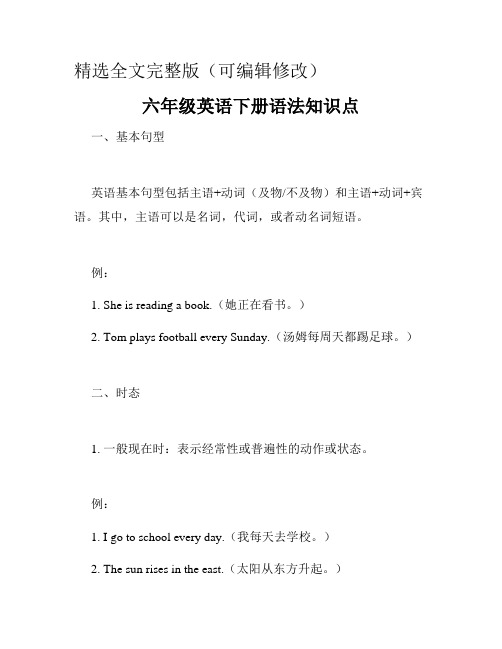
精选全文完整版(可编辑修改)六年级英语下册语法知识点一、基本句型英语基本句型包括主语+动词(及物/不及物)和主语+动词+宾语。
其中,主语可以是名词,代词,或者动名词短语。
例:1. She is reading a book.(她正在看书。
)2. Tom plays football every Sunday.(汤姆每周天都踢足球。
)二、时态1. 一般现在时:表示经常性或普遍性的动作或状态。
例:1. I go to school every day.(我每天去学校。
)2. The sun rises in the east.(太阳从东方升起。
)2. 现在进行时:表示现在正在进行的动作。
例:1. They are playing basketball in the park.(他们正在公园里打篮球。
)2. She is studying for the exam.(她正在为考试学习。
)3. 一般过去时:表示过去发生的动作或状态。
例:1. They visited their grandparents last week.(他们上周拜访了他们的祖父母。
)2. We lived in Paris for two years.(我们在巴黎住了两年。
)三、动词时态的转换动词时态可以通过时态的转换来表达过去、现在和将来的概念。
常见的时态转换有以下几种:1. 一般现在时转换为一般过去时:- am/is/are → was/were- do/does → did- have/has → had例:1. He is a teacher.(他是一名老师。
)→ He was a teacher.(他曾经是一名老师。
)2. They have a dog.(他们有一只狗。
)→ They had a dog.(他们曾经有一只狗。
)2. 一般现在时转换为一般将来时:将动词的原形后加上will。
例:1. She knows the answer.(她知道答案。
句子分析六年级下册重点句式总结与演练

句子分析六年级下册重点句式总结与演练一、简单句1. 主语 + 谓语动词例句:小明吃饭。
2. 主语 + 谓语动词 + 宾语例句:我喜欢看电影。
3. 主语 + 谓语动词 + 宾语 + 宾语补足语例句:他把房间打扫干净了。
二、并列句1. 并列连词(和、或、但、而等)连接的主观谓语结构例句:我喜欢吃苹果,但我不喜欢吃香蕉。
2. 并列连词(和、或、但、而等)连接的分句例句:他喜欢听音乐,而我喜欢看书。
三、选择疑问句1. 主语 + 助动词 + 谓语动词 + 宾语 + 否定词 + 宾语补足语 + 疑问词例句:你是不是喜欢吃苹果?2. 主语 + 助动词 + 谓语动词 + 宾语 + 疑问词例句:他吃什么了?四、特殊疑问句1. 疑问词 + 谓语动词 + 主语 + 宾语 + 宾语补足语例句:为什么你不喜欢吃水果?2. 疑问词 + 助动词 + 主语 + 谓语动词例句:哪本书是你最喜欢的?五、祈使句1. 动词原形 + 其他例句:请你帮我一个忙。
六、感叹句1. 主语 + 谓语动词 + 其他例句:多么美丽的花啊!七、同位语从句1. 主语 + 谓语动词 + 同位语从句例句:我听说你是明星。
八、定语从句1. 主语 + 谓语动词 + 定语从句例句:我喜欢穿红色的衣服。
九、宾语从句1. 主语 + 谓语动词 + 宾语从句例句:我知道他去了图书馆。
十、时间状语从句1. 主句 + 从句例句:当你到达学校时,上课已经开始了。
总结:通过六年级下册的学习,我们对各种句式有了更深入的了解和掌握。
简单句、并列句、选择疑问句等基本句式是我们最常见的句型,我们可以通过不断地练习,加强对这些句式的运用。
同时,特殊疑问句、祈使句、感叹句等句型也是我们需要掌握的,可以通过语境练习更好地理解和应用。
定语从句、宾语从句、时间状语从句等复杂句式的掌握需要我们更多的练习和积累。
只有不断提高对各种句式的理解和运用能力,我们才能在写作和口语表达中更加准确流畅地表达自己的意思。
2023年小学六年级毕业英语语法复习要点归纳人教版

小学英语语法点复习归纳一、名词复数规则1.一般状况下,直接加-s,如:book-books, bag-bags, cat-cats, bed-beds 2.以s、x、sh、ch结尾,加-es,如:bus-buses, box-boxes, brush-brushes, watch-watches3.以“辅音字母+y”结尾,变y为i, 再加-es,如:family-families, strawberry-strawberries4.以“f或fe”结尾,变f或fe为v, 再加-es,如:knife-knives5.不规则名词复数:man- , woman- , policeman-policewoman- , mouse- child-foot- ,.tooth- fish- , people- ,Chinese- , Japanese-I _________him _________this ___________her ______watch _______that _______photo ________diary ______day________ foot________ book_______ dress ________tooth_______ sheep ______box_______ strawberry _____thief _______yo-yo ______ peach______ sandwich ______tomato______ potato_______ paper_______ juice___________water________ milk________ rice__________ tea__________pork mutton二、一般目前时1.重点:(句子特性;以及第三人称动词旳变化原则)2. 句子出现旳时间标志为:often, usually, everyday,…等词汇)3. 动词变化规则:1).一般状况下,直接加-s,如:cook-cooks, milk-milks,climbs,cleans 2).以s. x. sh. ch. o结尾,加-es,如:guess-guesses, wash-washes, watch-watches, go-goes3).以“辅音字母+y”结尾,变y为i, 再加-es,如:study-studies专题练习:一.写出一下东西旳第三人称单数形式:drink ________ go _______ stay ________ make ________look _________ have_______ pass_______ carry ____come________ watch______ plant_______ fly ________study_______ brush________ do_________ teach_______二.用所给单词旳对旳形式填空1. He often ________(have) dinner at home.2. Daniel and Tommy _______(be) in Class One.3. We _______(not watch) TV on Monday.4. Nick _______(not go) to the zoo on Sunday.5. ______ they ________(like) the World Cup?6. What _______they often _______(do) on Saturdays?7. _______ your parents _______(read) newspapers every day?8. The girl _______(teach) us English on Sundays.9. She and I ________(take) a walk together every evening.10. There ________(be) some water in the bottle.11. Mike _______(like) cooking.12. They _______(have) the same hobby.13. My aunt _______(look) after her baby carefully.14. You always _______(do) your homework well.15. I _______(be) ill. I’m staying in bed.16. She _______(go) to school from Monday to Friday.17. Liu Tao _______(do) not like PE.18. The child often _______(watch) TV in the evening.19. Su Hai and Su Yang _______(have) eight lessons this term.20. What day _______(be) it today?三、目前进行时1.概念:表达正在进行旳动作。
六年级英语人教版下册知识汇总
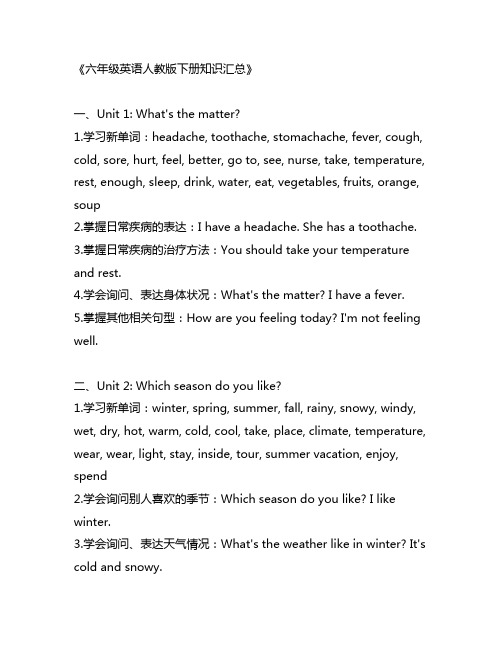
《六年级英语人教版下册知识汇总》一、Unit 1: What's the matter?1.学习新单词:headache, toothache, stomachache, fever, cough, cold, sore, hurt, feel, better, go to, see, nurse, take, temperature, rest, enough, sleep, drink, water, eat, vegetables, fruits, orange, soup2.掌握日常疾病的表达:I have a headache. She has a toothache.3.掌握日常疾病的治疗方法:You should take your temperature and rest.4.学会询问、表达身体状况:What's the matter? I have a fever.5.掌握其他相关句型:How are you feeling today? I'm not feeling well.二、Unit 2: Which season do you like?1.学习新单词:winter, spring, summer, fall, rainy, snowy, windy, wet, dry, hot, warm, cold, cool, take, place, climate, temperature, wear, wear, light, stay, inside, tour, summer vacation, enjoy, spend2.学会询问别人喜欢的季节:Which season do you like? I like winter.3.学会询问、表达天气情况:What's the weather like in winter? It's cold and snowy.4.学会描述喜欢的季节特征:I like summer because it's warm and sunny.5.学会描述自己在某个季节所做的活动:I stay inside and read in winter.三、Unit 3: What are you doing for vacation?1.学习新单词:museum, camping, hiking, zoo, beach, climb, mountain, forest, river, lake, trip, tour, visit, site, decide, activity, prepare, ready, camping, pack, tent,pass, sleeping bag, flashlight, mirror, toothbrush, toothpaste, camera2.学会询问别人在假期做什么:What are you doing for vacation? I'm camping.3.学会描述自己假期的计划:I'm climbing mountains and visiting the zoo.4.学会建议朋友假期活动:You should go hiking and visit the museum.5.掌握相关活动的动词表达:We're visiting a zoo and camping near a river.四、Unit 4: How do you get to school?1.学习新单词:bike, helicopter, skate, walk, bus, subway, train, car, taxi, boat, ship, ferry, ride, fast, foot, wear, seat, belt, important, drive, carefully, happily2.学会询问别人通常怎么上学:How do you get to school? I go to school by bike.3.学会描述自己怎么上学:I walk to school every day.4.学会询问别人怎么去某个地方:How do you get to the zoo? I go by subway.5.掌握相关交通工具的动词表达:I ride a ferry to get to the island五、Unit 5: How much is it?1.学习新单词:shopping, mall, bookstore, drugstore, toy store, shoe store, music store, price, store, sell, money, pay, spend, buy, cheap, expensive, sale, discount, Dollar, Cent, Euro, Pound, Yen, Yuan2.学会询问价格:How much is the T-shirt? It's $ 10.3.学会描述购物体验:I went to the bookstore and bought a book.4.学会询问和表达购物时的价格:The shoes are expensive. I spend $50 on theputer.5.掌握货币表达方式:How much is the dress? It's 100 yuan.六、Unit 6: I'm watching TV.1.学习新单词:play, TV,puter, video, game, chat, with, friend, alone, sometimes, air, outside, talk, on the phone, make, model, ship, airplane, kite, bird, rocket, fly, away2.学会询问别人在做什么:What are you doing? I'm playingputergames.3.学会描述自己正在做的事情:I'm watching TV and chatting with my friend.4.学会表达自己的喜好:I like playing video games and talking on the phone.5.学会表达某些特殊活动:I'm flying a kite in the park.七、Unit 7: What does she look like?1.学习新单词:young, old, have, long, short, curly, straight, blonde, hair, eyes, wear, glasses, big, small, pretty, handsome, tall, short, slim, heavy, dress, skirt, T-shirt, blouse, shirt2.学会询问看起来是什么样子:What does she look like? She is tall and slim.3.学会描述别人的外貌特征:She has long, curly hair and big eyes.4.学会询问和描述服装穿着:What is she wearing? She is wearinga skirt and a T-shirt.5.学会表达自己的外貌特征:I have short, straight hair and small eyes.八、Unit 8: How was your school trip?1.学习新单词:school trip, climb, mountain, wonder, student, teacher, guide, learn, lot, see, different, plant, animal, ground, sun, shine, sky, blue, tree, leaf, same, big, small, much, little2.学会询问和描述学校旅行的情况:How was your school trip? It was wonderful. We climbed a mountain and saw many different plants and animals.3.学会询问和表达在旅行中所见所闻:What did you see on the school trip? We saw a lot of birds and flowers.4.学会表达个人感受:It was a great experience. I learnt a lot during the school trip.5.掌握描述旅行中自然环境的单词和短语:There were many big trees and much sunshine during the school trip.九、Unit 9: When is Easter?1.学习新单词:month, year, holiday, Easter, Christmas, New Year's Day, Spring Festival, Halloween, Thanksgiving Day, Valentine's Day, Mother's Day, Father's Day, holiday, celebrate, on, in, when2.学会询问和表达节日时间:When is Christmas? It's on December 25th.3.学会介绍和讨论节日习俗:We celebrate Thanksgiving Day on the fourth Thursday of November.4.学会描述不同节日习俗:We give presents on Valentine's Day.5.学会对不同节日的预祝:Happy New Year! Happy Mother's Day!结语:以上是六年级英语人教版下册知识的汇总总结,通过对每个单元内容的梳理和归纳,可以更好地帮助学生系统地学习和掌握相关知识,在英语学习过程中取得更好的学习效果。
六年级下册英语重点知识总结人教版
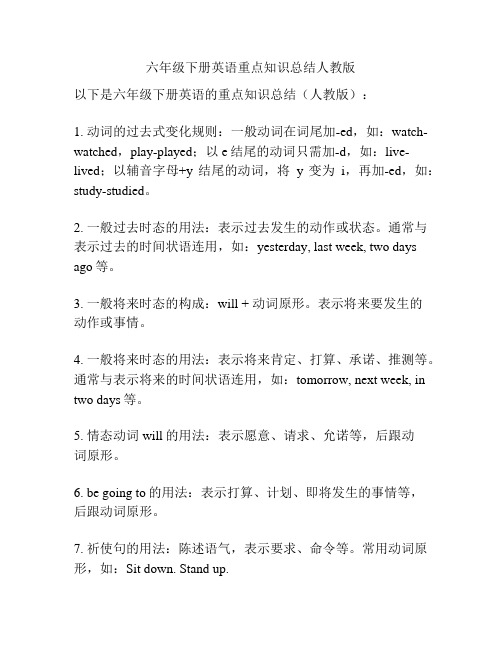
六年级下册英语重点知识总结人教版以下是六年级下册英语的重点知识总结(人教版):1. 动词的过去式变化规则:一般动词在词尾加-ed,如:watch-watched,play-played;以e结尾的动词只需加-d,如:live-lived;以辅音字母+y结尾的动词,将y变为i,再加-ed,如:study-studied。
2. 一般过去时态的用法:表示过去发生的动作或状态。
通常与表示过去的时间状语连用,如:yesterday, last week, two days ago等。
3. 一般将来时态的构成:will + 动词原形。
表示将来要发生的动作或事情。
4. 一般将来时态的用法:表示将来肯定、打算、承诺、推测等。
通常与表示将来的时间状语连用,如:tomorrow, next week, in two days等。
5. 情态动词will的用法:表示愿意、请求、允诺等,后跟动词原形。
6. be going to的用法:表示打算、计划、即将发生的事情等,后跟动词原形。
7. 祈使句的用法:陈述语气,表示要求、命令等。
常用动词原形,如:Sit down. Stand up.8. 情态动词can的用法:表示能力、允许等。
后跟动词原形。
9. 情态动词must的用法:表示必须、必然等。
后跟动词原形。
10. 情态动词should的用法:表示应该、建议等。
后跟动词原形。
11. 句型:What do you want to be? I want to be a(n) ______. 用于表达自己的职业理想。
12. 句型:Do you have any plans for the weekend? 用于询问对周末是否有计划。
13. 物主代词的用法:用于表示所有关系,如:my, your, his, her, its, our, their等。
14. 基数词与序数词的区别:基数词表示数量,如:one, two, three等;序数词表示顺序,如:first, second, third等。
人教版英语六年级第二单元知识点归纳
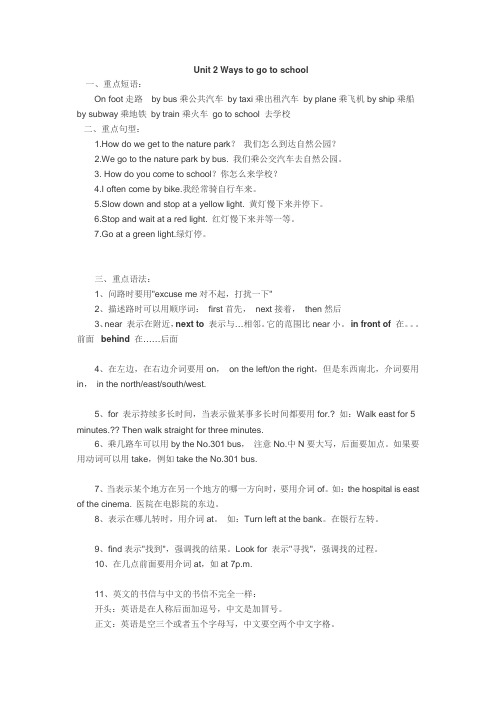
Unit 2 Ways to go to school一、重点短语:On foot走路by bus乘公共汽车by taxi乘出租汽车by plane乘飞机by ship乘船by subway乘地铁by train乘火车go to school 去学校二、重点句型:1.How do we get to the nature park?我们怎么到达自然公园?2.We go to the nature park by bus. 我们乘公交汽车去自然公园。
3. How do you come to school?你怎么来学校?4.I often come by bike.我经常骑自行车来。
5.Slow down and stop at a yellow light. 黄灯慢下来并停下。
6.Stop and wait at a red light. 红灯慢下来并等一等。
7.Go at a green light.绿灯停。
三、重点语法:1、问路时要用"excuse me对不起,打扰一下"2、描述路时可以用顺序词:first首先,next接着,then然后3、near 表示在附近,next to 表示与…相邻。
它的范围比near小。
in front of 在。
前面behind 在……后面4、在左边,在右边介词要用on,on the left/on the right,但是东西南北,介词要用in,in the north/east/south/west.5、for 表示持续多长时间,当表示做某事多长时间都要用for.? 如:Walk east for 5 minutes.?? Then walk straight for three minutes.6、乘几路车可以用by the No.301 bus,注意No.中N要大写,后面要加点。
如果要用动词可以用take,例如take the No.301 bus.7、当表示某个地方在另一个地方的哪一方向时,要用介词of。
- 1、下载文档前请自行甄别文档内容的完整性,平台不提供额外的编辑、内容补充、找答案等附加服务。
- 2、"仅部分预览"的文档,不可在线预览部分如存在完整性等问题,可反馈申请退款(可完整预览的文档不适用该条件!)。
- 3、如文档侵犯您的权益,请联系客服反馈,我们会尽快为您处理(人工客服工作时间:9:00-18:30)。
PEP小学英语重点句型语法总结人教版PEP教材在小学阶段涉及的重要语法知识主要有7种:to be句型、there be句型、一般现在时句型、现在进行时句型、一般过去时句型、情态动词can引导的型、be going to句型等,简要总结如下:[一] to be句型:用于介绍个人情况如姓名、健康状况、身份、国籍、家庭成员、朋友、职业等,描述地点、颜色、四季、日期、星期几等,该句型广泛分布于各册教材中,其中5—8册的句型主要有:1. Who’s your English teacher Mr. Carter.2. What’s he like He’s tall and strong.3. Is she quiet No, she isn’t. She is very active.4. Is she strict Yes, she is, but she’s very kind.5. What day is it today It’s Wednesday.6. What’s your favourite fruit/food…7. They’re sweet/ sour/ salty/ healthy/…8. When is your birthday It’s in May.9. My birthday is in June. Uncle Bill’s birthday is in June, too.10. Is her birthday in June Yes, it is.11. What’s the dateis Zhang Peng.13. Where is the cinema, please It’s next to the hospital.14. How tall are you I’m 164 cm tall.15. You are shorter than me.’re 4 cm taller than me.heavy are you I’m 48 kg.18. I’m thinner than you, and shorter.19. What’s the matter with you My throat is sore.20. How are you, Liu Yun / Sarah[二] there be句型:表示存在,即:“某处有某物”或“某时有某事”。
句型基本结构为:There is+ 可数名词单数或不可数名词+时间或地点。
There are+可数名词复数+地点。
该句型主要分布在第5册的Unit 5和Unit 6中,如:1. There are two bedrooms, a kitchen, a bathroom and a living room.2. There is a mirror, a bed and a big closet.3. Is there a forest in the park Yes, there is.4. Is there a river No, there isn’t.5. Are there any pandas in the mountains No, there aren’t.6. Are there any fish in the rivers Yes, there are.[三] 一般现在时句型:表示习惯性的动作或行为,或现在存在着的状况。
句型基本结构为:主语+行为动词+其他。
当主语是第三人称单数时,要在动词原形后面加s或es,其他人称作主语时则用动词原形,在问句及否定句中需要用助动词do或does。
这种句型通常有一些标志词,如:usually often sometimes never always等。
该句型主要分布在第5册Unit2&3,第6册Unit1&2, 第7册Unit4,5,6, 第8册Unit2中。
如:Book5:1. What do you have on Thursdays We have English, math and science on Thursdays.2. What do you do on Saturdays I watch TV on Saturdays.3. I do my homework.4. What do you have for lunch on Mondays We have tomatoes, tofu and fish.5. I like fruit. But I don’t like grapes.Book6:1. When do you eat dinner I eat dinner at 7:00 in the evening.2. When do you get up I usually get up at 12:00 noon.3. What do you do on the weekend Usually I watch TV and go shopping.4. Sometimes I visit my grandparents. I often play football. Sometimes I go hiking.5. Which season do you like best I like winter best.6. Why do you like summer/winterBook7:1. How do you go to school, Sarah2. Usually I go to school on foot. Sometimes I go by bike.3. I like collecting stamps. He likes collecting stamps, too.4. Does she teach math Yes, she does.5. Does she teach English No, she doesn’t. She teaches math.6. What does your mother do What does your father do7. Where does she work She works in a car company.8. How does she go to work She goes to work by bus.9. Where does the rain come from It comes from the clouds.10. Where does the cloud come from It comes from the vapour.11. Where does the vapour come from It comes from the water in the river.12. The sun shines and the water becomes vapour.13. How do you do thatBook8:1. My nose hurts.2. How do you feel I feel sick. How does Amy feel3. You look so happy. You look sad today.[四] 现在进行时句型:表示说话时正在进行的动作或事件,或在短期内正在进行的动作或存在的情况。
标志词是:now 也常用在Look! Listen!等后面。
句型主要结构为:be动词(am, is, are)+动词现在分词(v. ing)。
该句型主要分布在第6册Unit4, 5, 6中。
如:1. What are you doing I’m doing the dishes.I’m reading a book.2. Grandpa is writing a letter. Brother is doing homework. Mom is cooking dinner in the kitchen.3. He is writing an e-mail in the study.3. What is it doing It’s eating bananas.4. What is she doing She’s jumping.5. What are they doing They’re swimming.They’ re climbing trees.6. Are you eating lunch No, we aren’t.7. Are they eating the honey Yes, they are.8. Is he playing chess Yes, he is.9. Is she counting insects No, she isn’t.[五] 一般过去时句型:表示过去发生的而现在已经结束的事件、动作或情况。
句型基本结构为:主语+动词过去式+其他。
标志词通常是:yesterday, last week , last year 等,在问句与否定句中要用助动词did。
该句型分布在第8册Unit3&4中。
如:did you do last weekend I played football.2. Did you help them clean their room Yes, I did.did you do yesterday I went fishing.4. Did you read book Yes, I did.5. Did you clean your room No, I didn’t.did you go on your holiday I went to Xinjiang.7. What did you do there I sang and danced with my new friends.8. How did you go there I went by train.此外,一般过去时也可用来表示客气的询问。
如:Book3 Unit5, Book 5 Unit3中的:What would you like for lunch I’d like some…[六] 情态动词can引导的句型:表示有能力做某事,can后面的动词要用原形。
该句型主要分布在第5册Unit4和第7册Unit1中。
如:Book4: 1. What can you do I can sweep the floor. I can cook the meals.2. I can water the flowers.3. Can you make the bed No, I can’t.4. Can you use a computer Yes, I can.Book7: How can I get to Zhongshan Park You can go by the No. 15 bus.[七] 将来时:我们的教材中出现过两种表示将来时的句型,即:will和be going to句型,主要以be going to句型为主,表示将要做某事或打算做某事。
